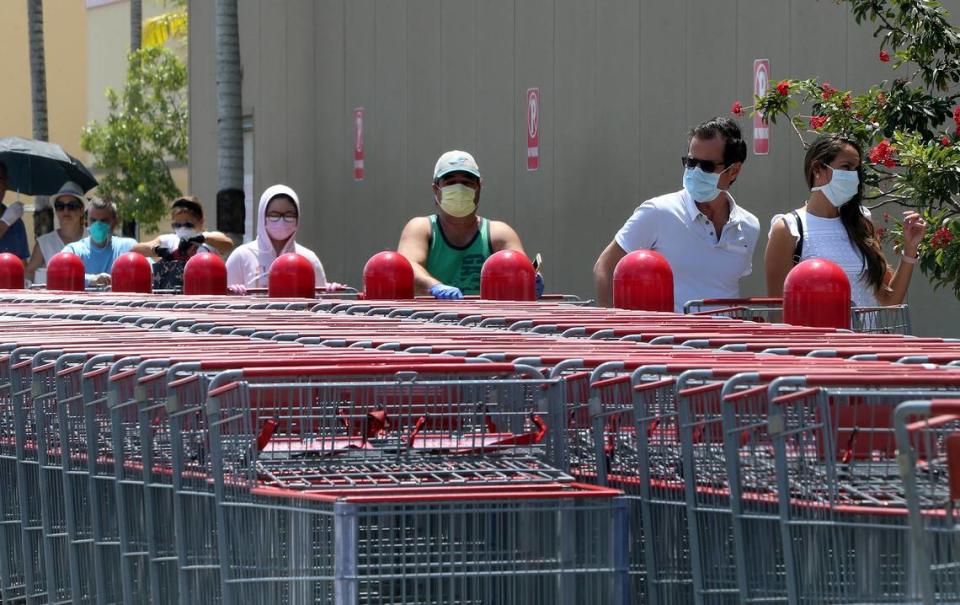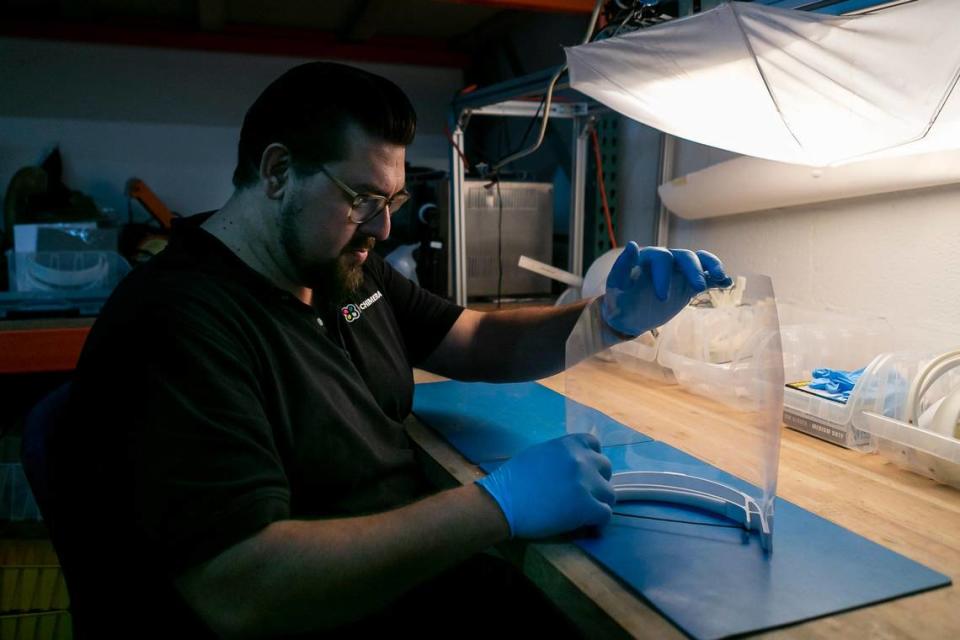Where to get masks that work, look good and even help a cause
Masks are the new normal during Florida’s COVID-19 stay-at-home order. You see people wearing them inside the grocery store, on the bus, even during a walk in the neighborhood.
Some are fashionable, with colorful prints and designs. Others look like the ones you buy at Home Depot or Lowe’s for a DIY home project. Many are home-made, created with bandannas, clothing and other fabric people found in their homes.
If you’re looking to buy or donate a mask or create your own, there are a few things you need to know, including how to properly wear one. Here’s what you need to know:
Who should wear a mask during the COVID-19 pandemic?
The Centers for Disease Control and Prevention has reversed course and is now recommending people wear a cloth face mask that covers your mouth and nose when out in public to help limit the spread of COVID-19, the disease caused by the novel coronavirus.
However, the CDC says children under 2 should not wear a cloth face mask. Others who should not wear a mask include anyone who has trouble breathing, is unconscious, incapacitated or otherwise unable to remove the mask without assistance.
What type of mask should I wear? What material should it be?

You can buy a mask online or make your own face covering at home. The CDC is asking you to avoid buying surgical masks or N-95 respirators — critical supplies needed at hospitals across the country.
If you do come across an unused surgical mask or N-95 respirator, you could always donate it to your local hospital. Many hospitals are accepting donations and would be grateful for the extra supplies.
If you’re planning to make a mask at home, health officials says bandannas and T-shirts are fairly effective in stopping viral particles — which typically spread when you cough, sneeze or touch your face and then touch a surface — from passing through the mask to the outside world, according to McClatchy News.
There are other household items you can create a mask with but some will be more effective than others. Officials say it usually depends on density.
Want to check if a fabric is an effective mask material? Hold it up to the light, Dr. Scott Segal, chairman of anesthesiology at Wake Forest Baptist Health, told the New York Times.
“If light passes really easily through the fibers and you can almost see the fibers, it’s not a good fabric,” he said. “If it’s a denser weave of thicker material and light doesn’t pass through it as much, that’s the material you want to use.”
Remember, your mask also needs to be breathable.
How to wear a mask and how to take it off safely?
The World Health Organization says you should wash your hands first with soap and water before touching the mask. Then inspect it for tears or holes and throw it out if it’s damaged, according to Healthline.
Cover your mouth and nose with the mask and make sure it fits snugly with no gaps between your face and the mask, according to WHO. If it’s a disposable mask, make sure the metal strip goes on top and use ties or ear loops to secure the mask, the CDC says.
Once you’re wearing the mask, do not touch it until you return home or you have to switch masks. This means you can’t pull the mask down to talk with someone or to drink a cafecito and then pull it back up. Your hands could contaminate your mouth or nose with whatever is on the mask or from what you previously touched.
Remember to follow social distancing and keep at least six feet away from others. The mask won’t protect you but it might help protect those around you, according to The Sacramento Bee.
Once you’re ready to take off the mask, untie or pull off the straps around your ears and keep the mask away from your face. Do not touch the front of the mask to take it off and do not touch your eyes, nose or mouth, according to WHO.
If it’s a disposable mask, throw it out in a closed trash bin. The CDC says you can safely clean reusable face coverings by using a washing machine.
Once you’ve disposed the mask or have thrown it in for a wash, go to the sink and wash your hands with soap and water for at least 20 to 30 seconds. There are dozens of songs you can sing to time yourself. The easiest one is “Happy Birthday.”
How pop stars are starting a hand-washing movement on social media to beat coronavirus
Where can I find a mask, face covering, to buy or donate?
If you want to find a lot of options fast without worrying about social distancing, check online. You can browse on Amazon, Ebay or visit your favorite retailer’s website, including CVS, Walgreens, Target and Walmart. You can also search for handmade masks on websites like Etsy.
If you’re interested in supporting local residents or are looking to donate supplies to healthcare workers, check out these options below. This list will be continuously updated:
Nonprofit Broward Health Foundation, the fundraising arm of Broward Health, has launched a COVID-19 Relief Fund. The nonprofit is specifically asking for N95 and surgical masks, face shields, gloves and isolation gowns. The Foundation is also asking for iPads so patients can speak with loved ones and is collecting funds to purchase personal protective equipment and other necessary supplies for its staff and patients.
Those who are interested in donating supplies should call 954-712-3980 or email BHFoundation@browardhealth.org. If you’re interested in donating money to help purchase supplies, visit BrowardHealthFoundation.org. You can also donate funds by phone at 954-712-3980 or by mail accompanied with the donation form available on the foundation’s website.
University of Miami medical students are collecting face masks, surgical caps, surgical gowns, 3D-printing material (PETG, BLA, PLA filament and medical/food-grade transparent film for face shields. The equipment will be donated to hospitals in South Florida.
The group said they’ve gathered thousands of pairs of gloves and face shields and more than a hundred N95 masks, as well as hundreds of appreciation cards for stressed-out healthcare workers about a week after their initiative began.
The students have also created a GoFundMe account for those who don’t have items to donate but are interested in supporting local healthcare workers. The money raised will be used to support numerous efforts, including producing 3D-printed face shields and meal and care packages deliveries to hospitals.
Those interested in donating can visit https://www.miamimedcovidhelp.com/donate for more information.
Martha of Miami’s “La Tiendecita” may be closed during the pandemic but her online store is still open. She’s selling face coverings and masks with a twist: She has a “Buy One, Donate One” option so you can help local hospitals get supplies. So far, the store says its donated more than 6,900 masks to South Florida hospitals.
And just like the rest of her store, the coverings and masks are very Miami:
A post shared by Martha of Miami (@marthaofmiami_shop) on Apr 12, 2020 at 4:52pm PDT
The face coverings ($14) come in two designs: Vicks Vaporub or cafecito. The store only has one mask option still available: A black single-sided mask with the words “Tapate La Boca” printed on it. The mask costs $11 and also has a “Donate Both” option. However, the website states that the mask is not medical-graded and is meant to be worn as a decoration over a medical-grade mask.
Those interested in purchasing a mask or face cover can visit https://www.marthaofmiami.com/collections/new-releases
Miami-based 3DChimera is selling 3D printed face shields for $20 and also offering a “Buy One, Give One” special to help an organization in need. The company told the Miami Herald earlier this month it was dropping off dozens to local hospitals daily, including Mount Sinai, Jackson Memorial and South Miami, and that Miami-Dade Police and Fire Rescue had also placed orders.
The company is also selling a 3D printed snorkel adapter for $10. The adapter was designed in collaboration with Dr. Roberto Miki, a hand surgeon with the University of Miami.

The adapter gives the user the ability to add a medical-grade air filter to a full-face snorkel mask. Some doctors who are facing N95 respirator shortages have begun to use similar inventions as an attempt to lessen their risk of becoming infected with COVID-19, the disease caused by the novel coronavirus.
Those interested in purchasing a shield or adapter can visit https://shop3dchimera.com/collections/covid-supplies
Do you know of a place with available face coverings, masks or shields? Ways people can donate equipment or funds to help purchase personal protective equipment for local doctors and nurses? Email the information to mmarchante@miamiherald.com and hcohen@miamiherald.com
Miami Herald staff writer Alex Harris contributed to this report.

